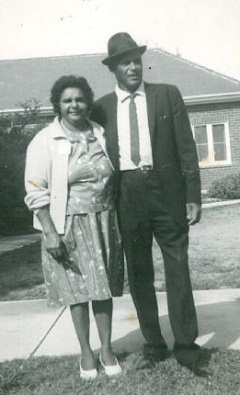 May and Lambert McBride in CanberraSource: Courtesy Linda McBride-Yuke
May and Lambert McBride in CanberraSource: Courtesy Linda McBride-Yuke
Lambert McBride was an Aboriginal advocate and lobbyist for Queensland Indigenous rights. Mr McBride believed in the value of education for progress and encouraged Indigenous people to get a good education.
To honour his work, the Queensland Government established the bursary as part of their celebrations to recognise the 40th anniversary of the 1967 Constitutional referendum.
Bursary benefits
The bursary provides a high-achieving Aboriginal and/or Torres Strait Islander full-time student a one-off bursary of $5,000 to assist with study-related expenses.
Eligibility criteria
To be eligible for this bursary, candidates must:
- be of Aboriginal and/or Torres Strait Islander descent
- commence their second or third year of an undergraduate or second year of a post-graduate degree—in any field—at a Queensland higher education institution (HEI).
How to apply
Applications for the 2026 Lambert McBride Perpetual Bursary close at midnight on Friday 12 December 2025.
Step 1: Gather your supporting documents that must be attached to your online application.
- Proof of Aboriginal or Torres Strait Islander descent
- Unofficial academic transcript/results for 2024 and 2025
- Proof of enrolment for Semester 1 2026 (may be included on the unofficial academic transcript)
- Resume / curriculum vitae
- 2 written references—1 must be from an Aboriginal and/or Torres Strait Islander person
Step 2: Submit your online application via the Smart Jobs 'apply now' button below.
Apply now
Enquiries and further information
If you have any questions about this bursary, contact our Scholarships and Grants team by email at
scholarships@qed.qld.gov.au or phone on (07) 3055 2991.
2025 bursary recipients
Anthony Warrell, Queensland University of Technology
Jazmin Grant, Bond University
Mr Lambert McBride: 1918–2002
Mr Lambert McBride, also known as Stan, was a Bundjalung, Yugambeh and Mulinjarli man. He was born in 1918 at Grady's Creek, about 10km from Kyogle, New South Wales.
He served in the 15th Battalion (Transport Division) during World War II and was in Townsville when it was bombed by the Japanese. He was later awarded the War Medal and the Australian Service Medal. These were presented with ceremony by Queensland Governor, His Excellency Major General Peter Arnison.
Mr McBride worked as a bullock team driver, a timber-getter, sugar cane cutter, railway fettler, bridge carpenter and wharfie. He also worked at many timber yards in Brisbane.
He was a fierce advocate and lobbyist for Aboriginal rights and was prepared to stand up for those who were treated unjustly. He joined the Queensland Council for the Advancement of Aborigines and Torres Strait Islanders (QCAATSI), and eventually became its President. As part of this work, Lambert and his wife, May, drove across Queensland registering Indigenous people for the electoral rolls.
Mr McBride was a pro-unionist and member of a number of unions. Throughout the 1960s, he drew on his union ties and associations, writing many letters asking the unions for both moral and financial support for Aboriginal social justice.
He promoted the 1967 Referendum campaign to amend the Australian Constitution and opposed Queensland Aboriginal protection legislation, considered at that time to be the most repressive in Australia. He also worked on negotiations which led to the formation of the National Aboriginal Advisory Council, the first such body to advise the federal government on Indigenous Affairs.
A self-educated man, Mr McBride believed in the value of education for progress. He encouraged Indigenous people to get a good education. His daughter, Linda, became the first Aboriginal student to complete grade 12 at Sandgate District High School and later earned a Bachelor of Arts in Political Science at the University of Queensland.
Mr McBride was a life member of the Koobara Aboriginal and Torres Strait Islander Kindergarten and of the One People of Australia League (OPAL). He was also an adopted Elder of the Taigum State School and a member of many other Aboriginal and Torres Strait Islander community organisations.
The McBrides moved to Zillmere in 1956. In 2002, the Brisbane City Council paid tribute to the outstanding contribution that Lambert McBride had made to Aboriginal social justice and reconciliation by naming a parkland at Zillmere after him.
The Lambert McBride Perpetual Bursary honours the role Mr McBride played in supporting the Aboriginal and Torres Strait Islander community. It also recognises his legacy to the wider community in supporting reconciliation.